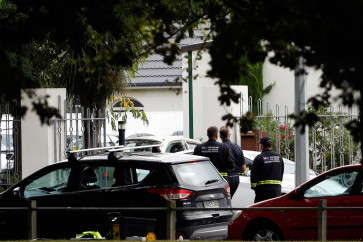Popular Reads
Top Results
Can't find what you're looking for?
View all search resultsPopular Reads
Top Results
Can't find what you're looking for?
View all search resultsThe paradox of New Zealand’s terror
Change text size
Gift Premium Articles
to Anyone
 Security officials walk outside the Masjid al Noor mosque after a shooting incident in Christchurch on March 15, 2019. - Attacks on two Christchurch mosques left at least 40 dead on March 15, with one gunman – identified as an Australian extremist -- apparently livestreaming the assault that triggered the lockdown of the New Zealand city. (AFP/Tessa Burrows)
Security officials walk outside the Masjid al Noor mosque after a shooting incident in Christchurch on March 15, 2019. - Attacks on two Christchurch mosques left at least 40 dead on March 15, with one gunman – identified as an Australian extremist -- apparently livestreaming the assault that triggered the lockdown of the New Zealand city. (AFP/Tessa Burrows)
T
he world has grieved at and condemned the savage killing of 50 worshipers at two mosques in Christchurch, New Zealand on March 15. According to the manifesto entitled “Great Replacement” the alleged killer uploaded in social media right before the attack, the act of terror was motivated by the anti-immigrant and anti-Muslim political attitude of white supremacy.
The suspect in the murders appears to have been inspired by the writings of right-wing French writer Renaud Camus who claims that the large number of immigrants to Europe, accompanied by high birth rates, will gradually erode the identity of individual nations and European culture. But why did the killer target Muslims? Why he did he kill Muslims in New Zealand, 19,000 kilometers away from France, where the anti-immigrant ideology developed?
International Migration Outlook for Organization for Economic Cooperation and Development (OECD) data in 2018 shows the foreign-born population in OECD countries in 2017 amounted to 127 million, up 3 percent from 2016. Migrants in those countries account for an average of 13 percent of the total population. Taken by country, the highest proportion of migrants to the total population was recorded in Luxembourg (46 percent), followed by Switzerland (29 percent), Australia (28 percent) and New Zealand (23 percent).
New Zealand is open to migrants. It is also the friendliest country for immigrants, as shown in Gallup 2016-2017 data, which indicated that, on a scale of 0 to 9, New Zealand ranked second in the index of most-accepting countries for migrants, with a score of 8.25 after Iceland with 8.26.
In countries where the proportion of migrants is relatively high, anti-immigrant sentiment is usually triggered by two things. First, socioeconomic aspects, related to concerns about reduced employment opportunities for locals, and second, sociocultural aspects: fear of eroding a nation’s cultural identity.
If the anti-immigrant sentiment is to be linked to the massacre of New Zealand Muslims, the motivation for the terrorist attack was somewhat ambiguous for two reasons.
First, New Zealand is a prosperous country with low unemployment rates and a population of less than 5 million. With such a socioeconomic profile, it is hard to imagine New Zealand becoming a place of struggle for job opportunities between locals and immigrants. With fairly high levels of education, competition in the lower end of the labor market, the jobs that are usually targeted by immigrants, is not so tight.

















